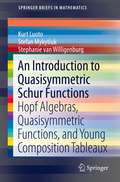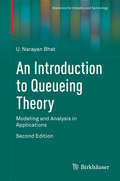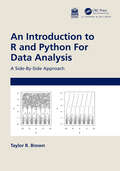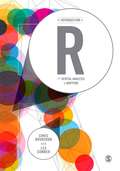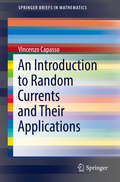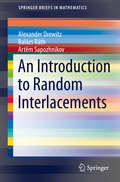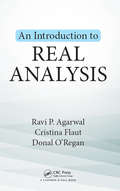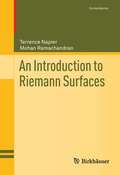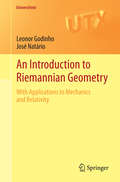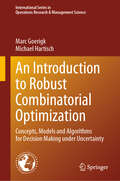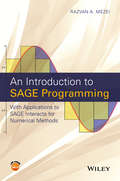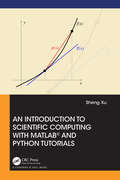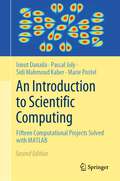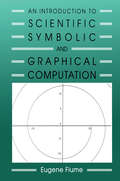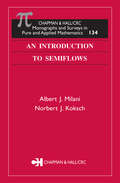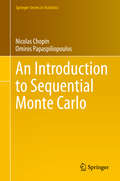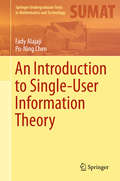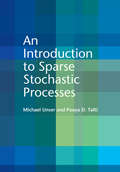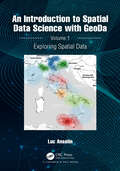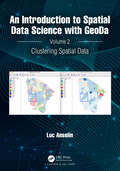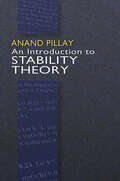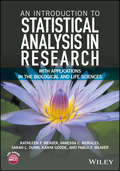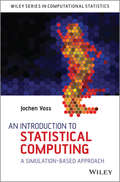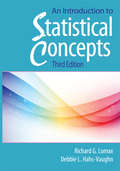- Table View
- List View
An Introduction to Quasisymmetric Schur Functions: Hopf Algebras, Quasisymmetric Functions, and Young Composition Tableaux (SpringerBriefs in Mathematics)
by Kurt Luoto Stephanie Van Willigenburg Stefan MykytiukAn Introduction to Quasisymmetric Schur Functions is aimed at researchers and graduate students in algebraic combinatorics. This book introduces readers to the algebra of quasisymmetric functions and its fundamental theory. Results and relevant new contributions are included which pertains to the dynamic new basis of quasisymmetric Schur functions. A state-of-the-art summary is included with respect to an exciting new basis of algebra, which is the basis of quasisymmetric Schur functions, whose combinatorics is analogous to that of the renowned Schur functions.
An Introduction to Queueing Theory: Modeling and Analysis in Applications (Statistics for Industry and Technology)
by U. Narayan BhatThis introductory textbook is designed for a one-semester course on queueing theory that does not require a course on stochastic processes as a prerequisite. By integrating the necessary background on stochastic processes with the analysis of models, the work provides a sound foundational introduction to the modeling and analysis of queueing systems for a broad interdisciplinary audience of students in mathematics, statistics, and applied disciplines such as computer science, operations research, and engineering. This edition includes additional topics in methodology and applications. Key features: * An introductory chapter including a historical account of the growth of queueing theory in more than 100 years. * A modeling-based approach with emphasis on identification of models * Rigorous treatment of the foundations of basic models commonly used in applications with appropriate references for advanced topics. * A chapter on matrix-analytic method as an alternative to the traditional methods of analysis of queueing systems. * A comprehensive treatment of statistical inference for queueing systems. * Modeling exercises and review exercises when appropriate. The second edition of An Introduction of Queueing Theory may be used as a textbook by first-year graduate students in fields such as computer science, operations research, industrial and systems engineering, as well as related fields such as manufacturing and communications engineering. Upper-level undergraduate students in mathematics, statistics, and engineering may also use the book in an introductory course on queueing theory. With its rigorous coverage of basic material and extensive bibliography of the queueing literature, the work may also be useful to applied scientists and practitioners as a self-study reference for applications and further research. ". . . This book has brought a freshness and novelty as it deals mainly with modeling and analysis in applications as well as with statistical inference for queueing problems. With his 40 years of valuable experience in teaching and high level research in this subject area, Professor Bhat has been able to achieve what he aimed: to make [the work] somewhat different in content and approach from other books. " - Assam Statistical Review of the first edition
An Introduction to R and Python for Data Analysis: A Side-By-Side Approach
by Taylor R. BrownAn Introduction to R and Python for Data Analysis helps teach students to code in both R and Python simultaneously. As both R and Python can be used in similar manners, it is useful and efficient to learn both at the same time, helping lecturers and students to teach and learn more, save time, whilst reinforcing the shared concepts and differences of the systems. This tandem learning is highly useful for students, helping them to become literate in both languages, and develop skills which will be handy after their studies. This book presumes no prior experience with computing, and is intended to be used by students from a variety of backgrounds. The side-by-side formatting of this book helps introductory graduate students quickly grasp the basics of R and Python, with the exercises providing helping them to teach themselves the skills they will need upon the completion of their course, as employers now ask for competency in both R and Python. Teachers and lecturers will also find this book useful in their teaching, providing a singular work to help ensure their students are well trained in both computer languages. All data for exercises can be found here: https://github.com/tbrown122387/r_and_python_book/tree/master/data. Instructors can access the solutions manual via the book's website. Key features: - Teaches R and Python in a "side-by-side" way. - Examples are tailored to aspiring data scientists and statisticians, not software engineers. - Designed for introductory graduate students. - Does not assume any mathematical background.
An Introduction to R for Spatial Analysis and Mapping
by Chris Brunsdon Lex Comber"In an age of big data, data journalism and with a wealth of quantitative information around us, it is not enough for students to be taught only 100 year old statistical methods using 'out of the box' software. They need to have 21st-century analytical skills too. This is an excellent and student-friendly text from two of the world leaders in the teaching and development of spatial analysis. It shows clearly why the open source software R is not just an alternative to commercial GIS, it may actually be the better choice for mapping, analysis and for replicable research. Providing practical tips as well as fully working code, this is a practical 'how to' guide ideal for undergraduates as well as those using R for the first time. It will be required reading on my own courses." - Richard Harris, Professor of Quantitative Social Science, University of Bristol R is a powerful open source computing tool that supports geographical analysis and mapping for the many geography and 'non-geography' students and researchers interested in spatial analysis and mapping. This book provides an introduction to the use of R for spatial statistical analysis, geocomputation and the analysis of geographical information for researchers collecting and using data with location attached, largely through increased GPS functionality. Brunsdon and Comber take readers from 'zero to hero' in spatial analysis and mapping through functions they have developed and compiled into R packages. This enables practical R applications in GIS, spatial analyses, spatial statistics, mapping, and web-scraping. Each chapter includes: Example data and commands for exploring it Scripts and coding to exemplify specific functionality Advice for developing greater understanding - through functions such as locator(), View(), and alternative coding to achieve the same ends Self-contained exercises for students to work through Embedded code within the descriptive text. This is a definitive 'how to' that takes students - of any discipline - from coding to actual applications and uses of R.
An Introduction to Random Currents and Their Applications (SpringerBriefs in Mathematics)
by Vincenzo CapassoThis book introduces random currents by presenting underlying mathematical methods necessary for applications. The theory of currents is an advanced topic in geometric measure theory that extends distribution to linear functionals within the space of differential forms of any order. Methods to extend random distributions to random currents are introduced and analyzed in this book. Beginning with an overview of mathematical aspects of the theory of currents, this book moves on to examine applications in medicine, material science, and image analysis. Applied researchers will find the practical modern mathematical methods along with the detailed appendix useful to stimulate new applications and research.
An Introduction to Random Interlacements (SpringerBriefs in Mathematics)
by Alexander Drewitz Balázs Ráth Artëm SapozhnikovThis book gives a self-contained introduction to the theory of random interlacements. The intended reader of the book is a graduate student with a background in probability theory who wants to learn about the fundamental results and methods of this rapidly emerging field of research. The model was introduced by Sznitman in 2007 in order to describe the local picture left by the trace of a random walk on a large discrete torus when it runs up to times proportional to the volume of the torus. Random interlacements is a new percolation model on the d-dimensional lattice. The main results covered by the book include the full proof of the local convergence of random walk trace on the torus to random interlacements and the full proof of the percolation phase transition of the vacant set of random interlacements in all dimensions. The reader will become familiar with the techniques relevant to working with the underlying Poisson Process and the method of multi-scale renormalization, which helps in overcoming the challenges posed by the long-range correlations present in the model. The aim is to engage the reader in the world of random interlacements by means of detailed explanations, exercises and heuristics. Each chapter ends with short survey of related results with up-to date pointers to the literature.
An Introduction to Real Analysis
by Ravi P. Agarwal Donal O'Regan Cristina FlautThis book provides a compact, but thorough, introduction to the subject of Real Analysis. It is intended for a senior undergraduate and for a beginning graduate one-semester course.
An Introduction to Riemann Surfaces (Cornerstones)
by Mohan Ramachandran Terrence NapierThis textbook presents a unified approach to compact and noncompact Riemann surfaces from the point of view of the so-called L2 $\bar{\delta}$-method. This method is a powerful technique from the theory of several complex variables, and provides for a unique approach to the fundamentally different characteristics of compact and noncompact Riemann surfaces. The inclusion of continuing exercises running throughout the book, which lead to generalizations of the main theorems, as well as the exercises included in each chapter make this text ideal for a one- or two-semester graduate course.
An Introduction to Riemannian Geometry: With Applications to Mechanics and Relativity (Universitext)
by Leonor Godinho José NatárioUnlike many other texts on differential geometry, this textbook also offers interesting applications to geometric mechanics and general relativity. The first part is a concise and self-contained introduction to the basics of manifolds, differential forms, metrics and curvature. The second part studies applications to mechanics and relativity including the proofs of the Hawking and Penrose singularity theorems. It can be independently used for one-semester courses in either of these subjects. The main ideas are illustrated and further developed by numerous examples and over 300 exercises. Detailed solutions are provided for many of these exercises, making An Introduction to Riemannian Geometry ideal for self-study.
An Introduction to Robust Combinatorial Optimization: Concepts, Models and Algorithms for Decision Making under Uncertainty (International Series in Operations Research & Management Science #361)
by Michael Hartisch Marc GoerigkThis book offers a self-contained introduction to the world of robust combinatorial optimization. It explores decision-making using the min-max and min-max regret criteria, while also delving into the two-stage and recoverable robust optimization paradigms. It begins by introducing readers to general results for interval, discrete, and budgeted uncertainty sets, and subsequently provides a comprehensive examination of specific combinatorial problems, including the selection, shortest path, spanning tree, assignment, knapsack, and traveling salesperson problems. The book equips both students and newcomers to the field with a grasp of the fundamental questions and ongoing advancements in robust optimization. Based on the authors’ years of teaching and refining numerous courses, it not only offers essential tools but also highlights the open questions that define this subject area.
An Introduction to SAGE Programming
by Razvan A. MezeiFeatures a simplified presentation of numerical methods by introducing and implementing SAGE programs An Introduction to SAGE Programming: With Applications to SAGE Interacts for Numerical Methods emphasizes how to implement numerical methods using SAGE Math and SAGE Interacts and also addresses the fundamentals of computer programming, including if statements, loops, functions, and interacts. The book also provides a unique introduction to SAGE and its computer algebra system capabilities, discusses second and higher order equations and estimate limits, and determines derivatives, integrals, and summations. Providing critical resources for developing successful interactive SAGE numerical computations, the book is accessible without delving into the mathematical rigor of numerical methods. The author illustrates the benefits of utilizing the SAGE language for calculus and the numerical analysis of various methods such as bisection methods, numerical integration, Taylor's expansions, and Newton's iterations. Providing an introduction to the terminology and concepts involved, An Introduction to SAGE Programming: With Applications to SAGE Interacts for Numerical Methods features: An introduction to computer programming using SAGE Many practical examples throughout to illustrate the application of SAGE Interacts for various numerical methods Discussions on how to use SAGE Interacts and SAGE Cloud in order to create mathematical demonstrations Numerous homework problems and exercises that allow readers to practice their programming skillset A companion website that includes related SAGE programming code and select solutions to the homework problems and exercises An Introduction to SAGE Programming: With Applications to SAGE Interacts for Numerical Methods is an ideal reference for applied mathematicians who need to employ SAGE for the study of numerical methods and analysis. The book is also an appropriate supplemental textbook for upper-undergraduate and graduate-level courses in numerical methods.
An Introduction to Scientific Computing with MATLAB® and Python Tutorials
by Sheng XuThis textbook is written for the first introductory course on scientific computing. It covers elementary numerical methods for linear systems, root finding, interpolation, numerical integration, numerical differentiation, least squares problems, initial value problems and boundary value problems. It includes short Matlab and Python tutorials to quickly get students started on programming. It makes the connection between elementary numerical methods with advanced topics such as machine learning and parallel computing. This textbook gives a comprehensive and in-depth treatment of elementary numerical methods. It balances the development, implementation, analysis and application of a fundamental numerical method by addressing the following questions. •Where is the method applied?•How is the method developed?•How is the method implemented?•How well does the method work? The material in the textbook is made as self-contained and easy-to-follow as possible with reviews and remarks. The writing is kept concise and precise. Examples, figures, paper-and-pen exercises and programming problems are deigned to reinforce understanding of numerical methods and problem-solving skills.
An Introduction to Scientific Computing: Fifteen Computational Projects Solved with MATLAB
by Ionut Danaila Pascal Joly Sidi Mahmoud Kaber Marie PostelThis book demonstrates scientific computing by presenting twelve computational projects in several disciplines including Fluid Mechanics, Thermal Science, Computer Aided Design, Signal Processing and more. Each follows typical steps of scientific computing, from physical and mathematical description, to numerical formulation and programming and critical discussion of results. The text teaches practical methods not usually available in basic textbooks: numerical checking of accuracy, choice of boundary conditions, effective solving of linear systems, comparison to exact solutions and more. The final section of each project contains the solutions to proposed exercises and guides the reader in using the MATLAB scripts available online.
An Introduction to Scientific, Symbolic, and Graphical Computation
by Eugene FiumeThis down-to-earth introduction to computation makes use of the broad array of techniques available in the modern computing environment. A self-contained guide for engineers and other users of computational methods, it has been successfully adopted as a text in teaching the next generation of mathematicians and computer graphics majors.
An Introduction to Semiflows
by Albert J. Milani Norbert J. KokschThis book introduces the class of dynamical systems called semiflows, which includes systems defined or modeled by certain types of differential evolution equations (DEEs). It focuses on the basic results of the theory of dynamical systems that can be extended naturally and applied to study the asymptotic behavior of the solutions of DEEs. The auth
An Introduction to Sequential Monte Carlo (Springer Series in Statistics)
by Nicolas Chopin Omiros PapaspiliopoulosThis book provides a general introduction to Sequential Monte Carlo (SMC) methods, also known as particle filters. These methods have become a staple for the sequential analysis of data in such diverse fields as signal processing, epidemiology, machine learning, population ecology, quantitative finance, and robotics.The coverage is comprehensive, ranging from the underlying theory to computational implementation, methodology, and diverse applications in various areas of science. This is achieved by describing SMC algorithms as particular cases of a general framework, which involves concepts such as Feynman-Kac distributions, and tools such as importance sampling and resampling. This general framework is used consistently throughout the book.Extensive coverage is provided on sequential learning (filtering, smoothing) of state-space (hidden Markov) models, as this remains an important application of SMC methods. More recent applications, such as parameter estimation of these models (through e.g. particle Markov chain Monte Carlo techniques) and the simulation of challenging probability distributions (in e.g. Bayesian inference or rare-event problems), are also discussed.The book may be used either as a graduate text on Sequential Monte Carlo methods and state-space modeling, or as a general reference work on the area. Each chapter includes a set of exercises for self-study, a comprehensive bibliography, and a “Python corner,” which discusses the practical implementation of the methods covered. In addition, the book comes with an open source Python library, which implements all the algorithms described in the book, and contains all the programs that were used to perform the numerical experiments.
An Introduction to Single-User Information Theory (Springer Undergraduate Texts in Mathematics and Technology)
by Fady Alajaji Po-Ning ChenThis book presents a succinct and mathematically rigorous treatment of the main pillars of Shannon’s information theory, discussing the fundamental concepts and indispensable results of Shannon’s mathematical theory of communications. It includes five meticulously written core chapters (with accompanying problems), emphasizing the key topics of information measures; lossless and lossy data compression; channel coding; and joint source-channel coding for single-user (point-to-point) communications systems. It also features two appendices covering necessary background material in real analysis and in probability theory and stochastic processes.The book is ideal for a one-semester foundational course on information theory for senior undergraduate and entry-level graduate students in mathematics, statistics, engineering, and computing and information sciences. A comprehensive instructor’s solutions manual is available.
An Introduction to Sparse Stochastic Processes
by Michael Unser Pouya D. TaftiProviding a novel approach to sparse stochastic processes, this comprehensive book presents the theory of stochastic processes that are ruled by stochastic differential equations, and that admit a parsimonious representation in a matched wavelet-like basis. Two key themes are the statistical property of infinite divisibility, which leads to two distinct types of behaviour - Gaussian and sparse - and the structural link between linear stochastic processes and spline functions, which is exploited to simplify the mathematical analysis. The core of the book is devoted to investigating sparse processes, including a complete description of their transform-domain statistics. The final part develops practical signal-processing algorithms that are based on these models, with special emphasis on biomedical image reconstruction. This is an ideal reference for graduate students and researchers with an interest in signal/image processing, compressed sensing, approximation theory, machine learning, or statistics.
An Introduction to Spatial Data Science with GeoDa: Volume 1: Exploring Spatial Data
by Luc AnselinThis book is the first in a two-volume series that introduces the field of spatial data science. It offers an accessible overview of the methodology of exploratory spatial data analysis. It also constitutes the definitive user’s guide for the widely adopted GeoDa open-source software for spatial analysis. Leveraging a large number of real-world empirical illustrations, readers will gain an understanding of the main concepts and techniques, using dynamic graphics for thematic mapping, statistical graphing, and, most centrally, the analysis of spatial autocorrelation. Key to this analysis is the concept of local indicators of spatial association, pioneered by the author and recently extended to the analysis of multivariate data.The focus of the book is on intuitive methods to discover interesting patterns in spatial data. It offers a progression from basic data manipulation through description and exploration to the identification of clusters and outliers by means of local spatial autocorrelation analysis. A distinctive approach is to spatialize intrinsically non-spatial methods by means of linking and brushing with a range of map representations, including several that are unique to the GeoDa software. The book also represents the most in-depth treatment of local spatial autocorrelation and its visualization and interpretation by means of GeoDa.The book is intended for readers interested in going beyond simple mapping of geographical data to gain insight into interesting patterns. Some basic familiarity with statistical concepts is assumed, but no previous knowledge of GIS or mapping is required.Key Features:• Includes spatial perspectives on cluster analysis• Focuses on exploring spatial data• Supplemented by extensive support with sample data sets and examples on the GeoDaCenter websiteThis book is both useful as a reference for the software and as a text for students and researchers of spatial data science.Luc Anselin is the Founding Director of the Center for Spatial Data Science at the University of Chicago, where he is also the Stein-Freiler Distinguished Service Professor of Sociology and the College, as well as a member of the Committee on Data Science. He is the creator of the GeoDa software and an active contributor to the PySAL Python open-source software library for spatial analysis. He has written widely on topics dealing with the methodology of spatial data analysis, including his classic 1988 text on Spatial Econometrics. His work has been recognized by many awards, such as his election to the U.S. National Academy of Science and the American Academy of Arts and Science.
An Introduction to Spatial Data Science with GeoDa: Volume 2: Clustering Spatial Data
by Luc AnselinThis book is the second in a two-volume series that introduces the field of spatial data science. It moves beyond pure data exploration to the organization of observations into meaningful groups, i.e., spatial clustering. This constitutes an important component of so-called unsupervised learning, a major aspect of modern machine learning.The distinctive aspects of the book are both to explore ways to spatialize classic clustering methods through linked maps and graphs, as well as the explicit introduction of spatial contiguity constraints into clustering algorithms. Leveraging a large number of real-world empirical illustrations, readers will gain an understanding of the main concepts and techniques and their relative advantages and disadvantages. The book also constitutes the definitive user’s guide for these methods as implemented in the GeoDa open source software for spatial analysis.It is organized into three major parts, dealing with dimension reduction (principal components, multidimensional scaling, stochastic network embedding), classic clustering methods (hierarchical clustering, k-means, k-medians, k-medoids and spectral clustering), and spatially constrained clustering methods (both hierarchical and partitioning). It closes with an assessment of spatial and non-spatial cluster properties.The book is intended for readers interested in going beyond simple mapping of geographical data to gain insight into interesting patterns as expressed in spatial clusters of observations. Familiarity with the material in Volume 1 is assumed, especially the analysis of local spatial autocorrelation and the full range of visualization methods.Luc Anselin is the Founding Director of the Center for Spatial Data Science at the University of Chicago, where he is also Stein-Freiler Distinguished Service Professor of Sociology and the College, as well as a member of the Committee on Data Science. He is the creator of the GeoDa software and an active contributor to the PySAL Python open-source software library for spatial analysis. He has written widely on topics dealing with the methodology of spatial data analysis, including his classic 1988 text on Spatial Econometrics. His work has been recognized by many awards, such as his election to the U.S. National Academy of Science and the American Academy of Arts and Science.
An Introduction to Special Functions (UNITEXT #102)
by Carlo ViolaThe subjects treated in this book have been especially chosen to represent a bridge connecting the content of a first course on the elementary theory of analytic functions with a rigorous treatment of some of the most important special functions: the Euler gamma function, the Gauss hypergeometric function, and the Kummer confluent hypergeometric function. Such special functions are indispensable tools in "higher calculus" and are frequently encountered in almost all branches of pure and applied mathematics. The only knowledge assumed on the part of the reader is an understanding of basic concepts to the level of an elementary course covering the residue theorem, Cauchy's integral formula, the Taylor and Laurent series expansions, poles and essential singularities, branch points, etc. The book addresses the needs of advanced undergraduate and graduate students in mathematics or physics.
An Introduction to Stability Theory (Dover Books on Mathematics)
by Anand PillayThis introductory treatment covers the basic concepts and machinery of stability theory. Lemmas, corollaries, proofs, and notes assist readers in working through and understanding the material and applications. Full of examples, theorems, propositions, and problems, it is suitable for graduate students in logic and mathematics, professional mathematicians, and computer scientists. Chapter 1 introduces the notions of definable type, heir, and coheir. A discussion of stability and order follows, along with definitions of forking that follow the approach of Lascar and Poizat, plus a consideration of forking and the definability of types. Subsequent chapters examine superstability, dividing and ranks, the relation between types and sets of indiscernibles, and further properties of stable theories. The text concludes with proofs of the theorems of Morley and Baldwin-Lachlan and an extension of dimension theory that incorporates orthogonality of types in addition to regular types.
An Introduction to Statistical Analysis in Research: With Applications in the Biological and Life Sciences
by Kanya Godde Kathleen F. Weaver Pablo F. Weaver Sarah L. Dunn Vanessa C. MoralesProvides well-organized coverage of statistical analysis and applications in biology, kinesiology, and physical anthropology with comprehensive insights into the techniques and interpretations of R, SPSS®, Excel®, and Numbers® output An Introduction to Statistical Analysis in Research: With Applications in the Biological and Life Sciences develops a conceptual foundation in statistical analysis while providing readers with opportunities to practice these skills via research-based data sets in biology, kinesiology, and physical anthropology. Readers are provided with a detailed introduction and orientation to statistical analysis as well as practical examples to ensure a thorough understanding of the concepts and methodology. In addition, the book addresses not just the statistical concepts researchers should be familiar with, but also demonstrates their relevance to real-world research questions and how to perform them using easily available software packages including R, SPSS®, Excel®, and Numbers®. Specific emphasis is on the practical application of statistics in the biological and life sciences, while enhancing reader skills in identifying the research questions and testable hypotheses, determining the appropriate experimental methodology and statistical analyses, processing data, and reporting the research outcomes. In addition, this book: • Aims to develop readers’ skills including how to report research outcomes, determine the appropriate experimental methodology and statistical analysis, and identify the needed research questions and testable hypotheses • Includes pedagogical elements throughout that enhance the overall learning experience including case studies and tutorials, all in an effort to gain full comprehension of designing an experiment, considering biases and uncontrolled variables, analyzing data, and applying the appropriate statistical application with valid justification • Fills the gap between theoretically driven, mathematically heavy texts and introductory, step-by-step type books while preparing readers with the programming skills needed to carry out basic statistical tests, build support figures, and interpret the results • Provides a companion website that features related R, SPSS, Excel, and Numbers data sets, sample PowerPoint® lecture slides, end of the chapter review questions, software video tutorials that highlight basic statistical concepts, and a student workbook and instructor manual An Introduction to Statistical Analysis in Research: With Applications in the Biological and Life Sciences is an ideal textbook for upper-undergraduate and graduate-level courses in research methods, biostatistics, statistics, biology, kinesiology, sports science and medicine, health and physical education, medicine, and nutrition. The book is also appropriate as a reference for researchers and professionals in the fields of anthropology, sports research, sports science, and physical education. KATHLEEN F. WEAVER, PhD, is Associate Dean of Learning, Innovation, and Teaching and Professor in the Department of Biology at the University of La Verne. The author of numerous journal articles, she received her PhD in Ecology and Evolutionary Biology from the University of Colorado. VANESSA C. MORALES, BS, is Assistant Director of the Academic Success Center at the University of La Verne. SARAH L. DUNN, PhD, is Associate Professor in the Department of Kinesiology at the University of La Verne and is Director of Research and Sponsored Programs. She has authored numerous journal articles and received her PhD in Health and Exercise Science from the University of New South Wales. KANYA GODDE, PhD, is Assistant Professor in the Department of Anthropology and is Director/Chair of Institutional Review Board at the University of La Verne. The author of numerous j
An Introduction to Statistical Computing: A Simulation-based Approach (Wiley Series in Computational Statistics)
by Jochen VossA comprehensive introduction to sampling-based methods in statistical computing The use of computers in mathematics and statistics has opened up a wide range of techniques for studying otherwise intractable problems. Sampling-based simulation techniques are now an invaluable tool for exploring statistical models. This book gives a comprehensive introduction to the exciting area of sampling-based methods. An Introduction to Statistical Computing introduces the classical topics of random number generation and Monte Carlo methods. It also includes some advanced methods such as the reversible jump Markov chain Monte Carlo algorithm and modern methods such as approximate Bayesian computation and multilevel Monte Carlo techniques An Introduction to Statistical Computing: Fully covers the traditional topics of statistical computing. Discusses both practical aspects and the theoretical background. Includes a chapter about continuous-time models. Illustrates all methods using examples and exercises. Provides answers to the exercises (using the statistical computing environment R); the corresponding source code is available online. Includes an introduction to programming in R. This book is mostly self-contained; the only prerequisites are basic knowledge of probability up to the law of large numbers. Careful presentation and examples make this book accessible to a wide range of students and suitable for self-study or as the basis of a taught course
An Introduction to Statistical Concepts: Third Edition
by Debbie L. Hahs-Vaughn Richard G. LomaxThis comprehensive, flexible text is used in both one- and two-semester courses to review introductory through intermediate statistics. Instructors select the topics that are most appropriate for their course. Its conceptual approach helps students more easily understand the concepts and interpret SPSS and research results. Key concepts are simply stated and occasionally reintroduced and related to one another for reinforcement. Numerous examples demonstrate their relevance. This edition features more explanation to increase understanding of the concepts. Only crucial equations are included.In addition to updating throughout, the new edition features: New co-author, Debbie L. Hahs-Vaughn, the 2007 recipient of the University of Central Florida's College of Education Excellence in Graduate Teaching Award. A new chapter on logistic regression models for today's more complex methodologies. More on computing confidence intervals and conducting power analyses using G*Power. Many more SPSS screenshots to assist with understanding how to navigate SPSS and annotated SPSS output to assist in the interpretation of results. Extended sections on how to write-up statistical results in APA format. New learning tools including chapter-opening vignettes, outlines, and a list of key concepts, many more examples, tables, and figures, boxes, and chapter summaries. More tables of assumptions and the effects of their violation including how to test them in SPSS. 33% new conceptual, computational, and all new interpretative problems. A website that features PowerPoint slides, answers to the even-numbered problems, and test items for instructors, and for students the chapter outlines, key concepts, and datasets that can be used in SPSS and other packages, and more. Each chapter begins with an outline, a list of key concepts, and a vignette related to those concepts. Realistic examples from education and the behavioral sciences illustrate those concepts. Each example examines the procedures and assumptions and provides instructions for how to run SPSS, including annotated output, and tips to develop an APA style write-up. Useful tables of assumptions and the effects of their violation are included, along with how to test assumptions in SPSS. 'Stop and Think' boxes provide helpful tips for better understanding the concepts. Each chapter includes computational, conceptual, and interpretive problems. The data sets used in the examples and problems are provided on the web. Answers to the odd-numbered problems are given in the book. The first five chapters review descriptive statistics including ways of representing data graphically, statistical measures, the normal distribution, and probability and sampling. The remainder of the text covers inferential statistics involving means, proportions, variances, and correlations, basic and advanced analysis of variance and regression models. Topics not dealt with in other texts such as robust methods, multiple comparison and nonparametric procedures, and advanced ANOVA and multiple and logistic regression models are also reviewed.Intended for one- or two-semester courses in statistics taught in education and/or the behavioral sciences at the graduate and/or advanced undergraduate level, knowledge of statistics is not a prerequisite. A rudimentary knowledge of algebra is required.
